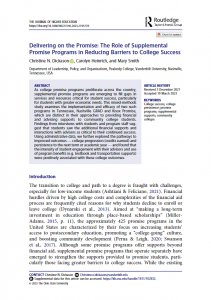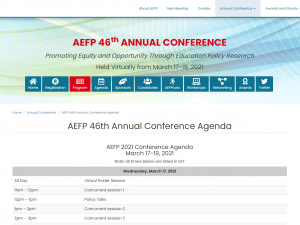
TN-PEARL was created in 2017 to research the effectiveness of initiatives developed under Tennessee’s “Drive to 55” campaign.
Featured Research
“Delivering on the Promise: The Role of Supplemental Promise Programs in Reducing Barriers to College Success“, by Christine N. Dickason, Vanderbilt University; Carolyn Heinrich, Vanderbilt University; and Mary Smith, Vanderbilt University.
An excerpt:
As college promise programs proliferate across the country, supplemental promise programs are emerging to fill gaps in services and resources critical for student success, particularly for students with greater economic needs. This mixed-methods study examines the implementation and efficacy of two such programs in Tennessee, Nashville GRAD and Knox Promise, which are distinct in their approaches to providing financial and advising supports to community college students. Findings from interviews with students and program staff suggest that students saw the additional financial supports and interactions with advisers as critical to their continued success. Using administrative data, we further explored the pathways to improved outcomes — college progression (credits earned) and persistence to the next term or academic year — and found that the intensity of student engagement with their advisors and use of program benefits (e.g. textbook and transportation supports) were positively associated with these college outcomes.
“Building Community and Technical College Capacity Through State Funding” by Cara DeLoach, Vanderbilt University; Adela Soliz, Vanderbilt University; and Hidahis Mesa, Vanderbilt University.
An excerpt:
This article analyzes the implementation of two state grant programs in Tennessee aimed at improving the quality of in-demand postsecondary career and technical education (CTE) programming at community and technical colleges. We use insights from our findings to propose a conceptual framework for understanding how external funding can reduce institutional capacity constraints in similar contexts.
Latest News
College students who work more hours are less likely to graduate
Jan. 11, 2023 (The Conversation)
Tennessee Should Do More To Support Students To Complete Postsecondary Education, Economic Report Finds
July 13, 2020 (SCORE)
Annenberg Institute, Results for America Announce EdResearch for Recovery Project
June 30, 2020 (Results for America)
Tennessee sees high school college-going rate dip, but leaders say it isn’t cause for concern
Aug. 5, 2019 (The Tennessean)
5 things to know about the Tennessee Promise Scholarship
May 6, 2019 (The Brookings Institution)
Get in Touch with TN-PEARL
Have questions or comments? Send us a message.


